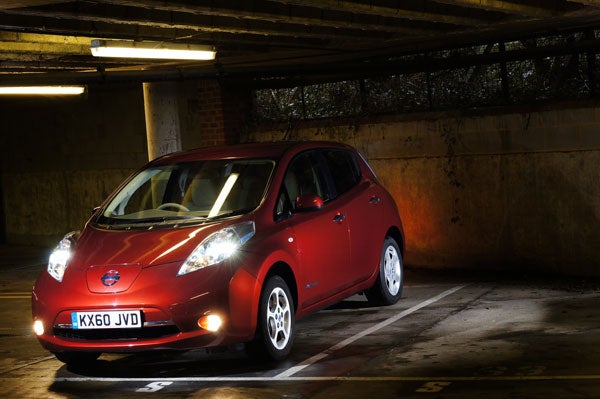Nissan Leaf

Your support helps us to tell the story
From reproductive rights to climate change to Big Tech, The Independent is on the ground when the story is developing. Whether it's investigating the financials of Elon Musk's pro-Trump PAC or producing our latest documentary, 'The A Word', which shines a light on the American women fighting for reproductive rights, we know how important it is to parse out the facts from the messaging.
At such a critical moment in US history, we need reporters on the ground. Your donation allows us to keep sending journalists to speak to both sides of the story.
The Independent is trusted by Americans across the entire political spectrum. And unlike many other quality news outlets, we choose not to lock Americans out of our reporting and analysis with paywalls. We believe quality journalism should be available to everyone, paid for by those who can afford it.
Your support makes all the difference. Price: £23,990
Top speed: Over 90mph Range 109 miles (EU NEDC test)
Tailpipe C02 emissions: zero
CO2 impact: depends on power station fuel mix
Best for: short journeys
Also worth considering? Lexus CT 200h, Mitsubishi i-MiEV, Toyota Prius
If I had to choose one word to capture the essence of the new battery-powered Nissan Leaf, it would have to be "brilliant". If there is a single word of qualification that describes its most important limitation, it is "range".
The Leaf's brilliance is hard to over-state. Pretty much every other plug-in electric car is either an adaptation of an existing car – for example, the Mitsubishi i-MiEV – or a low volume model that doesn't pretend to provide the sort of space, comfort and practicality that mainstream conventionally powered cars do; the popular G-Wiz falls into this category. The Leaf is something else. For the first time, one of the world's leading car groups has engineered a purpose-designed electric vehicle to compete (almost) without excuses against established petrol and diesel cars. It has been the subject of the same sort of major development programme, the sort that costs billions, as any other Nissan has, and is going into full mass production at the company's plants around the world, including in the UK.
The result is, in most respects, astonishingly good. The drivetrain is superb; gloriously smooth and quiet, it probably has the capacity to persuade even the most hardened petrolhead that electric cars can be fun. And its handling and road-holding are of a pretty high order too, so you won't be turning over a new Leaf if you buy one – except in the metaphorical sense of cleaning up your act by embracing low-emissions motoring. Nissan has also hidden the batteries well; they barely impinge on the space provided for passengers or their luggage. Quality and attention to detail are excellent.
The one respect in which the Leaf can't keep up with the competition, of course, is in terms of the distance it can travel before it needs to be recharged – perhaps a hundred miles if you're lucky. I think current concerns about the range of electric vehicles will fade as drivers learn how to adapt their driving styles in order to maximise battery life, technology improves and more public recharging points are established. Research shows that most motorists' daily mileage can be accommodated by the Leaf anyway.
Nevertheless, its limited range means that it is hard to recommend the Leaf as a first or only car for buyers who don't live in urban areas – for now. But for shorter journeys, for those who can afford it, Nissan has probably come up with just about the best second car in the world.
Join our commenting forum
Join thought-provoking conversations, follow other Independent readers and see their replies
Comments